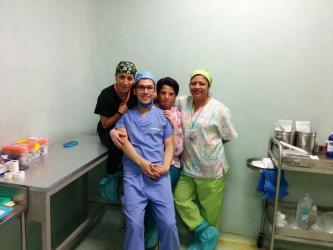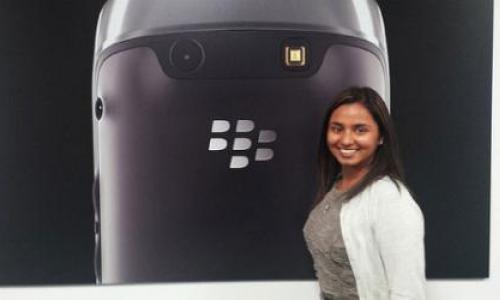
When I first came to SFU, I was a student in the Biological Sciences program. After my first year, I realized that I didn't just want to study living organisms, I wanted to learn about the human body. So at the end of my first year, I found myself transfering to the Biomedical Physiology program. Getting involved with Co-op near the end of my second year, I have taken classes and worked almost every semester. By April 2014, I was burnt out. I desperately needed a break from schoolwork and so I found myself diving into research. I had a fantastic learning opportunity as an employee of the Cardiovascular Physiology Laboratory at SFU, where I not only learned about the knowledge creation process, but the application of it as well. In this particular case, the application was to health care. I've always wanted to become a doctor, and never considered anything else, until now. My experience with the Cardiovascular Physiology Laboratory showed me that there is a need for ongoing research, and that I am someone that is capable of contributing positively to such a field. Furthermore, I have seen the benefits of what a medical degree can confer to the scientific field. I always thought I'd become a practicing clinical physician, but now, I'm beginning to wonder if I could become a clinician scientist.
At the end of my work term in the Cardiovascular Physiology Laboratory, I was contacted by an Anesthesiologist in Mexico and asked if I would like to participate in a pilot internship program designed for students considering a career in medicine. After some contemplation, I jumped on this opportunity; As it turns out, it was an experience of a lifetime.
Mexico City
Despite being Mexican myself, I was quite nervous about spending several months in the capital city. Not only had I never been to Mexico City, but I was aware of the current political problems of the country, which not only manifested as violent unrest, but also compromised the health and safety of the general public. Regardless of how I felt, I knew that this was an opportunity I did not want to pass up. As a result, early on in September I found myself on a plane, and before I knew it, I was being picked up by my soon to be supervisor, Dr. Vasquez.
Unknowingly, I had arrived in Mexico just in time to celebrate Mexico's Independence Day. It was a long weekend and so I not only spent some time adjusting, but also spent some time in the city centre. On Independence Day, there were free public concerts throughout the entire region, and as luck would have it, not only was Dr. Vasquez able to accompany me, but I ended up front and centre (almost) to some of Mexico's most celebrated musicians.
At night, the city is absolutely beautiful; you can't even see the pollution, which makes the city scape that much more impressive. I remember sitting on a rooftop, gazing out across the city and just being calm. My mind never stops thinking, but in this one moment, it did - peace.
Hospital Gineco-pediatria 3A - The Internship
At the Gineco-pediatric hospital, my role was constantly changing throughout my time there. There was an academic component, a practical component, and a work component to my internship placement.
The academic and practical components were spread out throughout my time there. In the first few weeks, my placement began with the shadowing of Drs. Medellin, Arvisu, and Pimentel (Anesthesiologists). After my rotations with them had concluded, I was placed with an Internist, Dr. Rivero, and in my last few weeks, I was placed with a Trauma Surgeon, Dr. Lara. Each rotation with a doctor involved being present during pre-, intra-, and post-operative procedures. But regardless of who I was shadowing, there were weekly seminars and practical skills training modules that I attended. Every Wednesday, there was a pathophysiology seminar, organized to both complement the practical skills training modules, and the intern's placement. The practical skills training modules were every Tuesday and Thursday, where in a classroom setting, we covered techniques such as knot tying, stitching, asepsis, and manual ventilation. Furthermore, for those that required extra practice, non-invasive measurement techniques such as blood pressure and heart rate monitoring were reinforced.
The work component to my internship placement involved me working as a Medical Assistant. During clinical consultations, I would help by taking and recording vitals, weights, and keeping track of medical records. As a part of my clinical responsibilities, I spent some time participating in pre-anesthetic evaluations, learning about the role and dynamic between a doctor and a mother during the time leading up to child-birth. Furthermore, I found myself in the recovery ward a lot, assisting mothers provide care for their newly born children.
Part-way through my internship, there was an opening for some experience in the pediatric ward, assisting physicians perform health assessments on children. I applied, and after I was accepted, I spent sometime in the childcare clinic, comforting children before, during, and after their encounters with physicians.
Originally, my role was only to be that of a medical assistant. However, after a thorough review and evaluation of my academic curriculum and skillset, I was also permitted to work as an ECG Technician due to my academic studies having included training in ECG obtainment and interpretation. As a result, when I began working with Dr. Rivero, not only was I able to practice my clinical skills as a medical assistant, but I was also able to use my ECG training to obtain and interpret results within a medical setting.
By the time my placement with Dr. Lara came about, I thought I was prepared for anything. I'd seen people die, I'd seen people survive, and I'd seen new life come into this world. But obstetric and gynecological surgery and patient care are vastly different from that encountered in a critical care setting. My rotation with Dr. Lara was a night shift, 3 times a week, in the emergency ward of a hospital called "The Hospital of the Villa". This hospital was the designated hospital for those without an adequate medical insurance plan and therefore was relatively underfunded. Furthermore, the hospital was in an area that was run down and so regularly receives a lot of patients that are either homeless, involved in criminal activity, or patients that are considered high risk criminals and require a police escort to ensure the safety of the medical practitioners during their care. However, I was surprisingly not intimidated. I had somehow been able to derive strength from my purpose, which was to assist in the care of everyone that needed it. So in this hospital, my role was also that of a Medical Assistant/ECG technician. Due to the hospital being over-saturated with patients, my presence was received with a warm welcome and each day I was partnered with a different doctor depending on the current need. Here, my role was to essentially assist the doctor with whatever he or she was doing; Sometimes this meant sorting, cleaning, and providing gauzes, and other times it meant wound cleansing or running medical reports and x-rays between labs.
Whenever there was a gun-shot wound victim, or a victim of an assault that had lead to a life-threatening injury, I was always placed with Dr. Lara. When accompanying Dr. Lara, I shadowed him from the moment the patient came into the hospital, through to surgery, and afterwards, in the recovery ward.
Key Moments and Clinical Cases: Babies, Mothers, and Hearts
During my time in Mexico, I was exposed to as many aspects of the health care system as could be permitted. What I learned is that health care isn't just providing medical attention. It is patient care, or rather, patient-centred care. There is a dynamic between a medical professional and the patient. An understanding - a relationship if you will, no matter how short-lived.
While at the hospitals, there were several moments that impacted me to such a degree, that I will carry them with me for as long as I breathe.
The first moment was my very first time witnessing child birth. It is just like in the movies, only messier. However, witnessing the struggle a mother has to go through in order to deliver her baby is what I found most astounding. Yes, it is amazing that human biology permits the accomodation of one human being inside of another. And it is further astonishing still, that a baby is able to accomodate to the mother's anatomy. However, it is the love a mother has for her child, born or not, that has no equal. Even when a mother is dying during labour, that she would be willing to say, amidst all of her pain "save the baby" - that is what I noticed and that is what impacted me the most. There were few instances when this occurred, but when it did happen, not once did I ever hear a mother shout "save MY baby"; this careful choice of words, I believe, is a testament to a mother's love for her child and her wilingness to put that child's life above her own.
The love a mother has for her child, and the valor with which she will defend that child is something I will never forget.
The second moment for me, is actually every time I saw a mother see her child for the first time. This moment, if I may speak so boldly, is what makes everything experienced by a mother and a health practitioner up to child-birth that makes it all worth it. To witness this is to witness time itself stop. This is the very first time two people connect on a level that no one could ever understand; The contrast between all of the emotions a mother must be feeling compared to the baby's evident need for all of those emotions. It is in this moment when you can see everything else fade away, and nothing else matters. It is just one human being, and her love for another human being that she doesn't know yet, and yet already knows so well. In this moment, you can see the child grow and flourish, the hardships they will face, and the triumphs they will have. This is the manifestation of a mother's love for her child.
The third moment for me was the very first time I witnessed another human being die. A young, soon-to-be mother, was rushed to the hospital one morning due to an episode of eclampsia (convulsions in a pregnant women following a dramatic rise in blood pressure). She was breathing and had a pulse one minute, and the next, she was unresponsive. In the time it took me to blink, compressions were being delivered and the automatic electrical defibrillator was being prepared. A few moments later her pulse returned. As they aspirated her lungs, the collection container filled with a red fluid that wasn't quite blood. This woman had aspirated some stomach fluids and her lung tissue was now damaged and rapidly filling with what is essentially blood filtrate. Furthermore, the compressions had caused some internal bleeding and this woman's life was beginning to wane. Her pulse stopped two more times, and after 20 minutes of CPR, she was declared dead. Her baby, as she was only 5 months pregnant, was not developed enough to survive outside of the womb and also perished. I don't think I'd every been so emotionallly conflicted before this moment. It was something new, and yet it was a reality I had to face. Medicine isn't perfect, and people do die. Several medical professionals burst into tears, and after the moment transpired, my supervisor called me in for a debriefing session. He knew it was my first time witnessing someone pass away, and when he asked me how I was doing, or what I was feeling, I responded with the following:
I'm feeling so many emotions right now, and I'm not sure which ones to let myself feel. I believe that while it is important that I am emotionally healthy and able to function, every patient deserves the full attention of a health practitioner. I believe that everyone did the best they could within the realm of their responsibilities, and that, in-and-of-itself, should be understood as a sign of respect for the patient that died. Furthermore, I understand that there are still many patients to come, and I'm sure that several of the doctors involved with the young woman's procedure are already attending to other patients. And while at first I thought this would be difficult to do, wondering what kind of mental fortitude one must need in order to continue immediately after such an event, I realized that not only is it part of a medical professional's responsibility to attend to every patient with the fullness of his/her capacity, but that also, perhaps some continue on immediately after out of respect to those that have passed away. And in a way, I can see how out of such a tragic event, one might draw strength moving forward.
The fourth and final key moment for me was my encounter with a patient and his family just before a thoracotomy (a surgical procedure used to gaineaccess to the chest cavity) in order to extract a bullet from behind one of the lungs. I was with the patient in the pre-operative ward where he was being monitored just before admitance into surgery when he asked me if I thought he was going to die. Honestly, I had no idea what his chances of survival were. I'd been briefed by Dr. Lara before hand about his condition, the nature and the extent of the bullet wound, and the risks associated with the procedure, but it was not within my prerogative to directly address such a question. Regardless of my level of preparedness, this young man was waiting for an answer. I looked around me and not only was his attending physician not around, but this night, the hospital had been particularly understaffed and there was no one around for me to defer to. I could see the worry in his eyes, he was about to cry and my heart was breaking for him, so I did the only thing I could do for him - be there for him. I began by informing him of the nature of his question and the appropriatness, if not necessity, that it be his attending physicians who inform him of the risks associated with his current state. Then I let him know that he wasn't alone and asked him to tell me about his life, everything he was thinking and feeling, and to tell me about all of the things he would do after he wakes up from his surgery. We'd had a few laughs, though pained he was, when his immediate family arrived to see him. The doctor informed them that the young man's condition was quite grave, and that the procedure had several risks and complications associated with it. He prepared them for the worst, and then as we were about to give them a moment alone, the patient asked both the doctor and his family if I could stay with him. All parties consented to my presence and I stayed, only to bear testimony to the most heart-breaking goodbye I have ever witnessed.
I thought I'd seen it all. I've been on several mission's trips where I've witnessed poverty, disparity, and civil unrest. I've seen people be happy through the worst of times, this happiness being one that did not come from wealth. Happiness that is not suppressed by poverty. A happyness that comes from within one's own desire to be happy regardless of their circumstances. A happyness that stems solely from the value of friendship, family, community, and a desire to live. I've have been tested in my own personal struggles - tragedies that I will never forget. I thought I'd seen it all. I'd never been more mistaken. This internship in the Fall of 2015 was only just the beginning. And I understand that now.
This international Co-op opportunity has afforded me with the opportunity to challenge myself in ways I did not think possible. To discover who I am, and who I might be, and above all, to apply a purpose to my studies.
I've always wanted to become a doctor, and that has only been reinforced by this eye-opening experience. It wasn't until recently that I thought I could do research. Whether I choose medicine, research, or as I've been more recently considering, both, I know one thing for certain. Not only do I believe I am equipped to take on any of these potential futures, but as a present student and future graduate of Simon Fraser University, I will engage the world.















